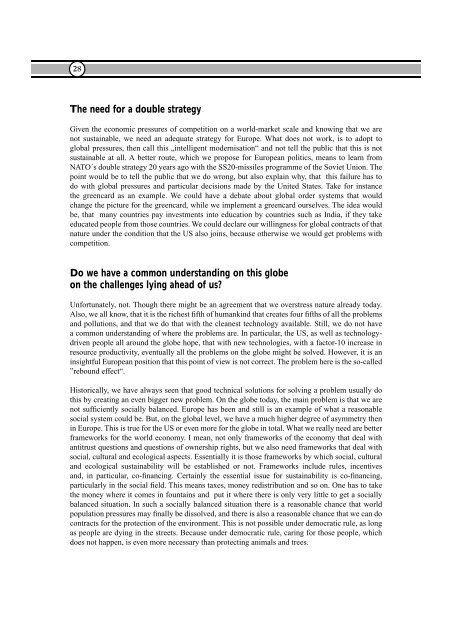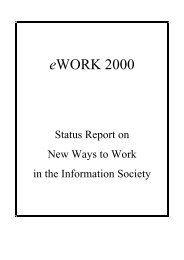Proceedings of 8th European Assembly on telework (Telework2001)
Proceedings of 8th European Assembly on telework (Telework2001)
Proceedings of 8th European Assembly on telework (Telework2001)
You also want an ePaper? Increase the reach of your titles
YUMPU automatically turns print PDFs into web optimized ePapers that Google loves.
28The need for a double strategyGiven the ec<strong>on</strong>omic pressures <str<strong>on</strong>g>of</str<strong>on</strong>g> competiti<strong>on</strong> <strong>on</strong> a world-market scale and knowing that we arenot sustainable, we need an adequate strategy for Europe. What does not work, is to adopt toglobal pressures, then call this „intelligent modernisati<strong>on</strong>“ and not tell the public that this is notsustainable at all. A better route, which we propose for <str<strong>on</strong>g>European</str<strong>on</strong>g> politics, means to learn fromNATO´s double strategy 20 years ago with the SS20-missiles programme <str<strong>on</strong>g>of</str<strong>on</strong>g> the Soviet Uni<strong>on</strong>. Thepoint would be to tell the public that we do wr<strong>on</strong>g, but also explain why, that this failure has todo with global pressures and particular decisi<strong>on</strong>s made by the United States. Take for instancethe greencard as an example. We could have a debate about global order systems that wouldchange the picture for the greencard, while we implement a greencard ourselves. The idea wouldbe, that many countries pay investments into educati<strong>on</strong> by countries such as India, if they takeeducated people from those countries. We could declare our willingness for global c<strong>on</strong>tracts <str<strong>on</strong>g>of</str<strong>on</strong>g> thatnature under the c<strong>on</strong>diti<strong>on</strong> that the US also joins, because otherwise we would get problems withcompetiti<strong>on</strong>.Do we have a comm<strong>on</strong> understanding <strong>on</strong> this globe<strong>on</strong> the challenges lying ahead <str<strong>on</strong>g>of</str<strong>on</strong>g> us?Unfortunately, not. Though there might be an agreement that we overstress nature already today.Also, we all know, that it is the richest fifth <str<strong>on</strong>g>of</str<strong>on</strong>g> humankind that creates four fifths <str<strong>on</strong>g>of</str<strong>on</strong>g> all the problemsand polluti<strong>on</strong>s, and that we do that with the cleanest technology available. Still, we do not havea comm<strong>on</strong> understanding <str<strong>on</strong>g>of</str<strong>on</strong>g> where the problems are. In particular, the US, as well as technologydrivenpeople all around the globe hope, that with new technologies, with a factor-10 increase inresource productivity, eventually all the problems <strong>on</strong> the globe might be solved. However, it is aninsightful <str<strong>on</strong>g>European</str<strong>on</strong>g> positi<strong>on</strong> that this point <str<strong>on</strong>g>of</str<strong>on</strong>g> view is not correct. The problem here is the so-called”rebound effect“.Historically, we have always seen that good technical soluti<strong>on</strong>s for solving a problem usually dothis by creating an even bigger new problem. On the globe today, the main problem is that we arenot sufficiently socially balanced. Europe has been and still is an example <str<strong>on</strong>g>of</str<strong>on</strong>g> what a reas<strong>on</strong>ablesocial system could be. But, <strong>on</strong> the global level, we have a much higher degree <str<strong>on</strong>g>of</str<strong>on</strong>g> asymmetry thenin Europe. This is true for the US or even more for the globe in total. What we really need are betterframeworks for the world ec<strong>on</strong>omy. I mean, not <strong>on</strong>ly frameworks <str<strong>on</strong>g>of</str<strong>on</strong>g> the ec<strong>on</strong>omy that deal withantitrust questi<strong>on</strong>s and questi<strong>on</strong>s <str<strong>on</strong>g>of</str<strong>on</strong>g> ownership rights, but we also need frameworks that deal withsocial, cultural and ecological aspects. Essentially it is those frameworks by which social, culturaland ecological sustainability will be established or not. Frameworks include rules, incentivesand, in particular, co-financing. Certainly the essential issue for sustainability is co-financing,particularly in the social field. This means taxes, m<strong>on</strong>ey redistributi<strong>on</strong> and so <strong>on</strong>. One has to takethe m<strong>on</strong>ey where it comes in fountains and put it where there is <strong>on</strong>ly very little to get a sociallybalanced situati<strong>on</strong>. In such a socially balanced situati<strong>on</strong> there is a reas<strong>on</strong>able chance that worldpopulati<strong>on</strong> pressures may finally be dissolved, and there is also a reas<strong>on</strong>able chance that we can doc<strong>on</strong>tracts for the protecti<strong>on</strong> <str<strong>on</strong>g>of</str<strong>on</strong>g> the envir<strong>on</strong>ment. This is not possible under democratic rule, as l<strong>on</strong>gas people are dying in the streets. Because under democratic rule, caring for those people, whichdoes not happen, is even more necessary than protecting animals and trees.








